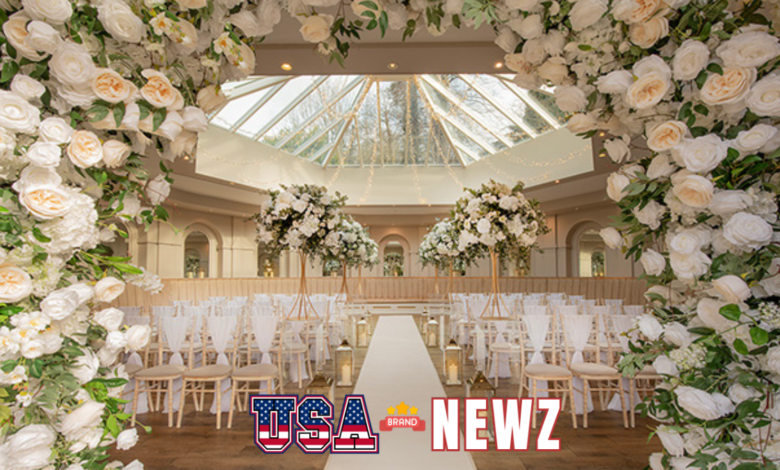The Ultimate Guide to Choosing the Perfect Wedding Venue

Choosing the right wedding venue is one of the most crucial decisions you’ll make during the wedding planning process. It sets the tone for your special day and impacts every aspect of your celebration, from the theme and décor to the comfort of your guests. In this guide, we’ll walk you through the different types of wedding venues, factors to consider, the amenities and services they offer, and legal considerations you should keep in mind. Whether you’re looking for a traditional venue, an outdoor space, or something more unique, this guide will help you make an informed decision that suits your style, budget, and vision for your big day.
Types of Wedding Venues
1.1 Traditional Venues
When you think of a wedding venue, the classic image often involves a traditional setting. Churches, historic estates, and banquet halls are popular choices for couples who want a formal or timeless feel for their wedding day. A church wedding provides a spiritual and reverent setting, with its beautiful architecture and the familiarity of sacred rituals. Historic buildings and estates, on the other hand, offer a sense of grandeur and elegance that can make your day feel like a royal affair. Banquet halls in hotels or country clubs are also reliable choices, with built-in services like catering and planning assistance, making them convenient for couples looking for a seamless experience.
Choosing a traditional venue offers benefits like historical charm, established reputations, and a built-in team that can help manage logistics. However, it may also come with certain limitations in terms of customization or flexibility. These venues may have strict rules about decor or layout, and their availability might be limited during peak wedding seasons. Nonetheless, if you’re aiming for a sophisticated, classic wedding, traditional venues remain a top choice for many couples.
1.2 Outdoor Venues
Outdoor weddings are becoming increasingly popular, as they allow couples to take advantage of natural beauty. Whether it’s a sprawling garden, a beach, or a vineyard, outdoor venues provide a romantic and serene setting for your ceremony. Gardens and parks offer lush greenery and blooming flowers, making them perfect for a spring or summer wedding. A beach wedding brings an element of relaxation and exotic charm, as the sound of waves and the scent of the ocean fill the air. Vineyards and rustic farms offer a unique, countryside experience, often providing ample space for both the ceremony and reception.
The allure of outdoor venues lies in their flexibility and the ability to customize them to fit your vision. You can enhance your outdoor setting with creative decor, and the natural backdrop can make for stunning wedding photos. However, weather is a major consideration when choosing an outdoor venue. It’s essential to have a backup plan, such as a tent or indoor location, in case of inclement weather. Additionally, outdoor venues may require more logistics, such as providing seating, restrooms, and catering services.
1.3 Unique and Unconventional Venues
For couples seeking something different, unique and unconventional venues offer an opportunity to break away from the traditional wedding mold. Museums, art galleries, and theaters provide a sophisticated and cultural backdrop for your ceremony. If you’re a fan of history or art, these venues offer a setting that reflects your personal interests and passions. Barns, rustic venues, and rooftop locations also provide a distinct vibe for those who want a more casual, intimate, or urban atmosphere for their wedding.
These venues often require creative thinking when it comes to decoration and layout, but they can create a memorable and one-of-a-kind experience for you and your guests. However, unconventional venues may not come with the same built-in amenities as traditional venues, so be prepared to arrange for services such as catering, sound systems, and other necessities.
1.4 Destination Weddings
Destination weddings are ideal for couples who want to combine their wedding day with a memorable vacation experience. Whether you choose a tropical island, a charming European village, or a chic city abroad, destination weddings offer a sense of adventure and intimacy. These weddings typically involve a smaller guest list, making them perfect for couples who want to share their special day with only close family and friends.
The main benefit of a destination wedding is the chance to get married in a stunning location, but it also comes with its own set of challenges. Planning a wedding from afar can be stressful, especially when dealing with time zones, language barriers, and unfamiliar wedding regulations. To ensure everything goes smoothly, it’s crucial to work with a local wedding planner or coordinator who can help you navigate the logistics.
Factors to Consider When Choosing a Wedding Venue
2.1 Budget and Pricing
Before you start visiting venues, it’s important to determine your wedding budget. Wedding venues can range from affordable to extravagant, and the venue will often be the largest portion of your overall budget. Traditional venues like churches and hotels may offer packages, while unique or outdoor venues could require more customization, affecting the cost. Make sure to consider not just the base price of the venue, but also any additional fees for things like parking, cleaning, or security.
Venues may also charge differently depending on the time of year, with peak wedding seasons (spring and summer) generally costing more than off-peak times (fall and winter). Be transparent with the venue about your budget to avoid surprises, and remember to account for hidden costs that may come up during the planning process.
2.2 Guest List and Venue Capacity
Your guest list will be a major factor in choosing the right venue. The venue should be large enough to comfortably accommodate your guest list, but not so large that it feels empty or lacking in atmosphere. Consider the type of wedding you want—whether it’s an intimate gathering or a large celebration—and choose a venue that fits accordingly.
Some venues may have strict capacity limits, so it’s important to narrow down your guest list early on and ensure that the venue can handle the number of attendees you plan to invite. Many venues offer flexible layouts and configurations, allowing you to make the most of the space available.
2.3 Location and Accessibility
The location of your wedding venue is another crucial consideration. It should be accessible for your guests, particularly if they are traveling from out of town. Consider the convenience of transportation options such as nearby airports, hotels, or shuttle services. If your venue is located in a rural or remote area, you may need to provide extra accommodations for guests or organize transportation.
In addition, consider the local climate and how it might affect your plans, especially for outdoor venues. Check the weather patterns for your wedding season and prepare for contingencies such as unexpected rain or extreme temperatures.
2.4 Wedding Style and Theme Compatibility
The style and theme of your wedding should align with the venue’s overall aesthetic. Whether you envision a vintage, rustic, or modern wedding, the venue should be a backdrop that complements your vision. Some venues are inherently versatile and can be transformed to fit any theme, while others may have a distinct character that can influence your choice of decor and attire.
Pay attention to the architectural elements of the venue, the surrounding landscape, and the ambiance it creates. A venue with high ceilings and grand chandeliers might work perfectly for an elegant, formal wedding, while a cozy barn with string lights is ideal for a relaxed, rustic celebration.
Venue Amenities and Services
3.1 Catering and Food Options
Food plays a major role in the success of a wedding, and many venues offer catering services as part of their packages. When choosing a venue, check if they provide in-house catering or allow outside vendors. In-house catering can streamline your planning process, but it’s important to review menu options, flexibility, and any additional fees for customization.
If your venue allows outside catering, make sure to coordinate with the vendors and ensure they have the necessary facilities. Some venues might have exclusive catering partners, while others are more flexible. Don’t forget to account for dietary preferences or restrictions, ensuring that all guests have suitable food options.
3.2 Audio and Visual Equipment
The quality of audio and visual equipment at the venue is another important consideration. If you plan on having speeches, music, or multimedia presentations, confirm that the venue has a sound system, microphones, and lighting equipment available. Many modern venues are equipped with state-of-the-art AV facilities, but if you’re planning a unique setup, such as a live band or a slideshow, make sure the venue can accommodate your needs.
3.3 Wedding Planning Assistance
A wedding coordinator or venue manager can be invaluable during the planning process. Some venues offer dedicated wedding planners who can assist with everything from the ceremony setup to the reception. While many venues provide basic planning services, others may offer full wedding packages, including décor, flowers, and rentals.
If your venue does not provide a dedicated planner, consider hiring an independent wedding planner who can help manage the details. A professional planner can work with your chosen venue to ensure everything runs smoothly on the big day.
3.4 Accommodations for Guests
If your guests are traveling from out of town, it’s important to ensure there are adequate accommodations near the venue. Many venues, especially hotels and resorts, offer on-site lodging for guests, which can be convenient and ensure a seamless experience. For more remote venues, look for nearby hotels or rental properties and arrange shuttle services if necessary.
Legal Considerations and Contracts
4.1 Venue Policies and Restrictions
Before signing any contracts, be sure to review the venue’s policies and restrictions. Venues often have rules regarding alcohol consumption, noise levels, and curfews, especially if your wedding will go late into the night. Some venues may have strict policies about decorations, such as no open flames or limits on certain types of decor.
Make sure to understand the insurance requirements and the venue’s liability coverage. Many venues require couples to carry insurance in case of accidents or damages during the event.
4.2 Wedding Venue Contracts and Agreements
When you find the perfect venue, the next step is to sign a contract. Wedding venue contracts can be complex, so it’s essential to review them carefully. Make sure the contract clearly outlines payment terms, cancellation policies, and any additional fees or services.
Negotiating terms is common, especially if you are booking the venue during off-peak times or for a shorter duration. Be clear about what is included in the price (e.g., catering, chairs, tables) and ask about additional charges. A solid contract protects both you and the venue and ensures there are no surprises down the road.
Conclusion
Choosing the perfect wedding venue is a pivotal part of planning your dream wedding. With careful consideration of your budget, guest list, location, and desired atmosphere, you can find a venue that not only fits your needs but also creates an unforgettable experience. Remember to review the venue’s amenities, ask important questions, and ensure the venue’s policies align with your vision. By following these steps, you’ll be well on your way to securing the ideal venue for your big day.
Also Read: simpcityforum





